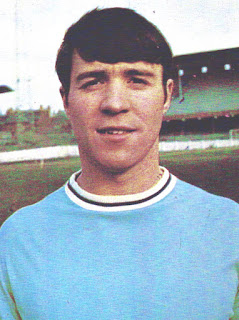Benny Glover is not a name that
immediately springs to mind when talking about Coventry City’s
promotion squad of 1967 and although he had one of the shortest
playing careers in the club’s history he did appear for the club in
that momentous season. Sadly I discovered last week that he passed
away earlier this year.
Fifty two years ago last weekend Benny
Glover made his one and only appearance for the Sky Blues when he
played the last thirty or so minutes as a substitute in City’s 3-2
victory over Cardiff City at Highfield Road. Five days later he
celebrated his 20th birthday.
Born in Birmingham he was the eighth of
14 children and was pinched by the Sky Blues from under the noses of
Aston Villa and Birmingham City. He came for a trial at Ryton in 1964
and agreed to play as an amateur. He played as a wing half in the
club’s youth team that season, appearing in the same team as Mick
Coop, John Burckitt, John Matthews and Pat Morrissey. By the summer
of 1966 he had made sufficient advancement to be offered a
professional contract and then made rapid progress after less than a
dozen reserve appearances to be considered for the first team.
On a Friday afternoon in early November
1966 club captain George Curtis walked up to him in the corridor
outside the dressing rooms at Highfield Road and asked, ‘Chicken or
steak for lunch tomorrow, Benny?’
He had been called into City’s 13-man
squad because of a doubt to Dietmar Bruck. If Bruck had failed a
fitness test Glover would have been 12th man and
substitute. As it turned out Bruck played and Benny had to wait a
further three weeks for his big chance.
The Cardiff game was a memorable one
for quite a few reasons. City’s record signing, Ian Gibson, was
restored to the first team by Jimmy Hill after six games on the
sidelines. Whilst the two had not patched up their differences –
caused either by Hill refusing to pay Gibbo’s bonuses or by his
tendency to play too deep, depending on who you believe – the
Scot’s form over the next few weeks healed the rift.
With Bill Glazier injured, his deputy
Coventry-born Peter Thomas made his debut in goal, it would be his
only ever appearance too. Another league debutant was Leamington’s
Mick Coop who had appeared as a substitute and played in a League Cup
game. Mick went on to play over 400 games for the club.
The win was the start of a terrific run
of 25 unbeaten games which extended from November through to the end
of the season and many looked back on Hill’s decision to recall
Gibson (largely forced on him because of injury) as a watershed in
that great campaign.
In Ben Glover’s 30 minutes of fame
against Cardiff he almost scored after being put clean through with
only the goalkeeper to beat. He came on for the injured John Tudor
and although he was substitute on two further occasions he failed to
get on the pitch and had to be content with regular reserve team
football for the next twelve months.
The competition for midfield places was
tough at Highfield Road with Willie Carr and Pat Morrissey in direct
competition and in February 1968 as Noel Cantwell started to thin
down a big professional playing staff Benny was released. He joined
Southern League Weymouth making over 230 appearances for the Dorset
side over four years and in 1972 joined Salisbury City.
Benny receiving his award from Paul Fletcher in 2007
In
retirement Benny lived just outside Tewkesbury. He enjoyed a game of
golf and one of his three children, daughter Mandy, represented Great
Britain at the 1996 Olympics in Atlanta in the volleyball team and is
still a major force in British volleyball. He
returned to the club in 2007 when the Former Players Association
organised a 40th anniversary reunion of the boys of 1967. He met
former colleagues he had not seen for almost 40 years and received a
memento from City chief executive Paul Fletcher.

















